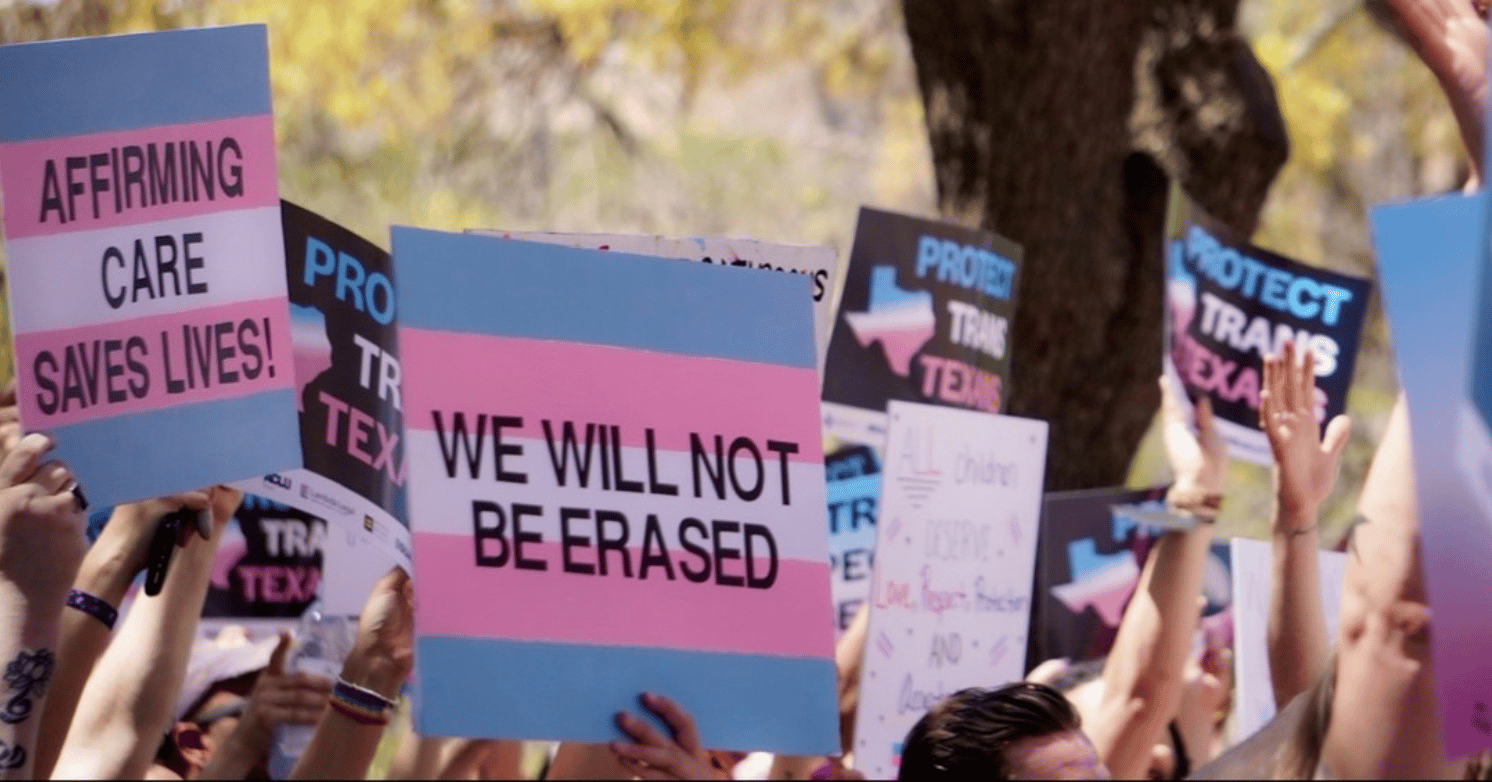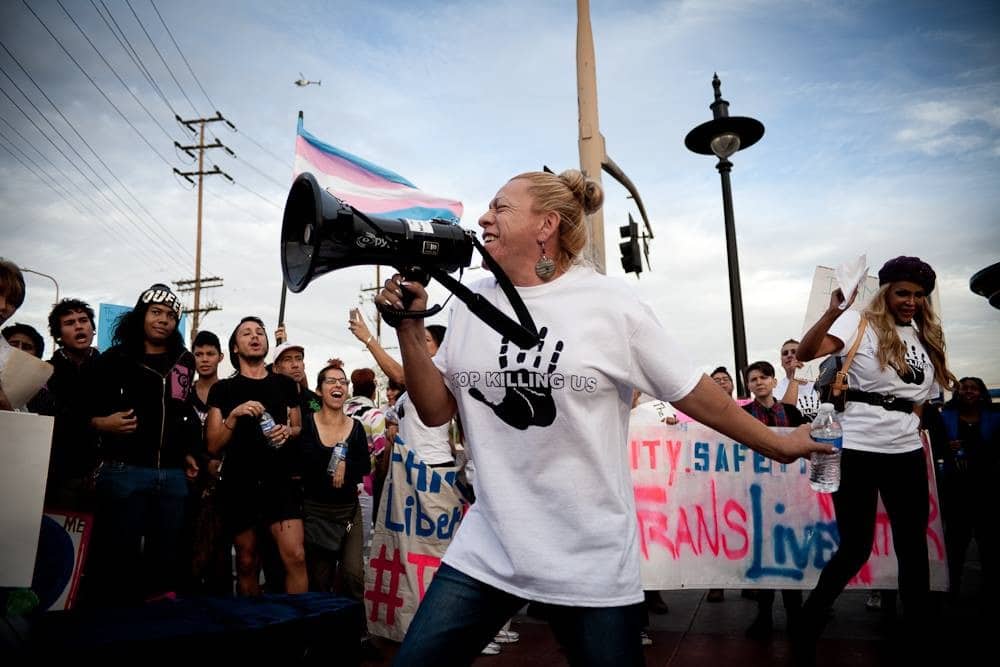
If you have come here to help me, you are wasting your time. But if you have come because your liberation is bound up with mine, then let us work together. – Lilla Watson, Indigenous scholar and organizer
Our hearts are with the victims, families, first responders, and communities of the horrific shooting at the LGBTQI+ nightclub in Colorado Springs on the eve of Transgender Day of Remembrance. It is our responsibility to not only collectively share the burden of grief but also the burden of our society’s responsibility.
We know our LGBTQI+ community members, especially transgender women and transgender women of color, are experiencing the highest levels of discrimination and gender-based violence. What we say and what we watch matters and we must hold those accountable who continue to perpetuate violence through harmful words, actions, and policies. Everyday we hear and see homophobic language that paints trans and queer folks as a threat to our society when really it is their liberation that holds the key to our collective freedom.
Collective liberation is just that: collective. We are bound to each other as we walk/march/work toward a future rooted in health, safety, and prosperity for all of us. Reproductive justice and bodily autonomy are queer issues, just as the violence and marginalization of trans and queer people are reproductive justice issues. This is intersectional feminism: our joy, our care, our grief, our persistence, our work together continues to bring us closer to our collective liberation.
The Intersection of Trans Rights and Reproductive Justice
by Saimary Velazquez Carrasquillo
Joela-Abiona Rivera (she/her), @missabolition on TikTok and founder of Abolition is Liberation (@thestonewallprotests) on Instagram, recently posted a video on the necessity of inclusive language surrounding abortion rights and the impacts of intersectional identities. In it she calls for Black people and Indigenous people to be at the center of abortion rights activism explaining how “Black and Indigenous TGNC people will also suffer greatly because not only will they have to deal with racism, but they will also have to deal with exclusion from this movement.” Rivera then provides examples of simple language changes that are inclusive and invite focused and collective efforts to ensure reproductive justice for all, stating, “Black women, Black birthing people, Black people with uteruses, abortion is their right. Indigenous women, Indigenous people with uteruses, Indigenous birthing people, abortion is their right.”
Following the overturn of Roe v. Wade, individuals flooded social media platforms, rallies, and government offices calling out injustice against bodily autonomy and reproductive rights. However, in this wave of commentary it became very easy for politicians and mainstream sources to label this as a women’s issue, erasing the voices of transgender and gender nonconforming individuals who also can give birth and now must face loss of bodily autonomy on top of existing discrimination for their gender identity and likely other facets of their identity (race, documentation status, ethnicity, etc).
For this piece, I was able to interview Women’s Foundation California grant partner TransLatin@ Coalition to talk about the intersection of trans rights and reproductive justice. I spoke with Bamby Salcedo (she/her/ella), President and CEO of the TransLatin@ Coalition, about the work of her organization and the larger reproductive justice movement. This was our conversation:

photo caption: Bamby Salcedo (she/her/ella), President and CEO of the TransLatin@ Coalition
QUESTION: How does the TransLatin@ Coalition’s work in policy address the intersectionality of trans justice and reproductive justice?
BAMBY:: The work that we do as an organization is multidimensional. We know that there are many different issues that impact the livelihood of trans, gender nonconforming, intersex individuals…[so we] as an organization function with two arms…we believe in the empowerment of our community through direct service provision, meaning if we are able to empower our community by providing people with the basic needs and services that they deserve, then [they] are better equipped to organize and mobilize their community, right? We also disrupt the way institutions within our society function… We influence change within those institutions through policy change…Reproductive justice is definitely one of the things that impact our community and so this is an issue that is at the forefront of the work that we do…to advocate for dignity and our rights.
QUESTION: What does your coalition believe is essential to the fight for trans inclusion in reproductive justice?
BAMBY: A lot of times we talk about trans inclusivity or trans people being included into issues but we have in multiple ways tried to do that over time and what we have learned is that there’s, even though there are attempts or intentions into being inclusive of trans people in different aspects of the tapestry of our society, we have learned that only us can do the work that needs to happen for us… that’s why we have built this organization, but at the same time part of our vision as an organization is to empower future leaders, be an organization that provides resources to our community. This is imperative to the work that we do and so we just need to make sure that yes, we can continue to push for us to be included, while at the same time we can continue to empower ourselves and to make sure that [we also contribute to] the changes that need to happen within our society, that we also create those changes so that we are also acknowledged as people and the contributions that we bring to movements and to also organizations.
QUESTION: What can individuals do to support trans justice and reproductive justice, especially those that are not familiar or don’t have experience with the topic?
BAMBY: What I would say to those that are not trans identifying, [is] to understand that there is a lot of work that needs to happen and that the broader trans community has been pushed to the side for many, many years, for decades, and so it is time for us to really understand that we need to invest in leadership of trans people, we need to invest in supporting trans people with the most basic things that we need because if we don’t then we’re not gonna be able to support the leadership that needs to happen within the trans community. It’s important that we understand that there is a different infrastructure development that needs to happen within the trans community for us to elevate ourselves into being at a different place within our society. Unfortunately, we’re one of the populations that’s in like the bottom of the bottom of the bottom.
For those of us who are trans identifying, I would say understand the importance of the collective power that we hold but also the individual power that we can bring to the broader movement. Do anything and everything that we can to empower ourselves but also to empower those who are coming after us. We need to build this into a generational approach within our community, so that we can continue to support one another, so that collectively we can create the changes that we need to happen in our community…We need to move from being victims into being thrivers.
I asked Bamby what she believes are the implications of ignoring the intersection between trans justice and reproductive justice. Bamby spoke about the use of language like intersectionality, and how organizations “just read definitions…it’s one thing to know the definition about a word like intersectionality but there is another thing that comes with it which is the intentionality.” Bamby spoke about the many facets that make up her identity, being an immigrant, trans, a survivor of incarceration, drug use, and more, calling herself “an intersection walking.” However, she feels that “many people, even those of us who are in social justice movements…only see one of those things. For instance, they only see my transness or they only see I am an immigrant, but they don’t see that when I enter any space I bring myself fully as I am with all of the different things that have crossed my life…” She suggests that we need to understand how to integrate these intersections into the work we do and be intentional about that. There is a need to fund and give directly to reproductive justice groups, particularly those that are BIPOC and trans-led. Through empowering these groups and community members we can bring about change that is lasting and inclusive for anyone who has a uterus.